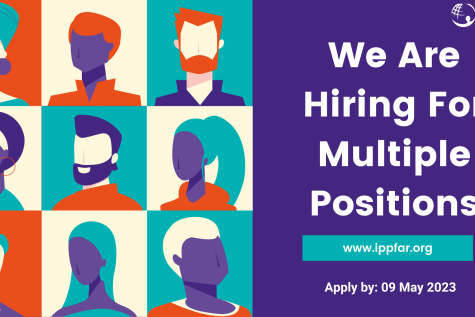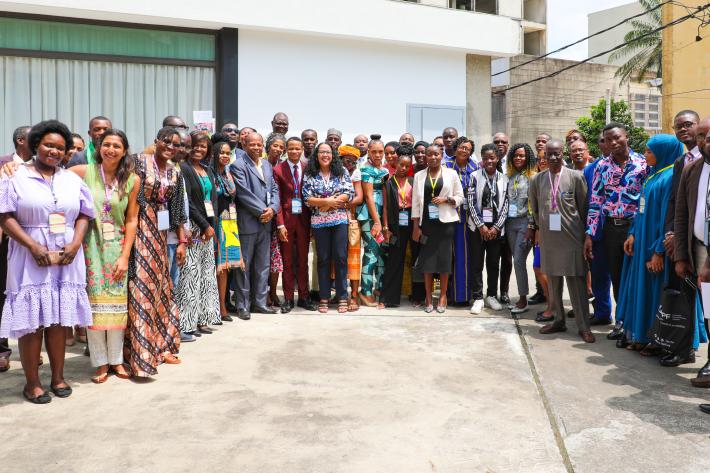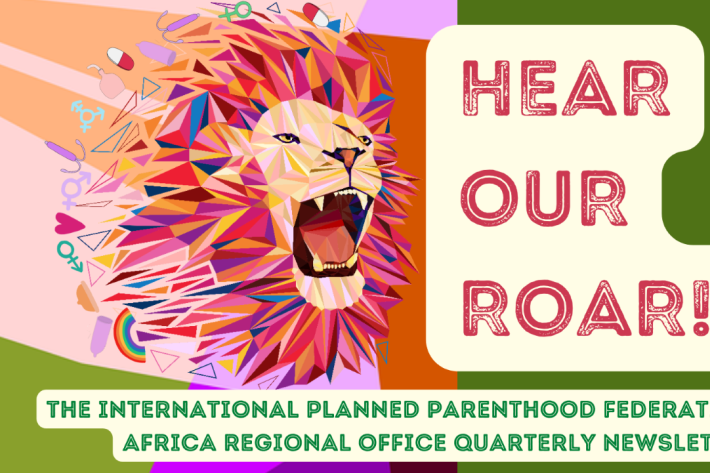
Spotlight
A selection of news from across the Federation

Africa
IPPF Africa Region is seeking talented individuals to support its work
In alignment with its strategy, the IPPF Africa Regional Office is hiring for multiple positions based in Kenya and Côte d'Ivoire.
Filter our news by:

| 10 April 2017
Second Phase of Journalists Network Project Kicks off in Nairobi
10 April 2017, Nairobi, Kenya. From 2012 – 2015, IPPF Africa Region implemented a ‘Networks’ project that involved the close collaboration of African journalists and Civil Society Organizations (CSOs) that have a bias in reproductive health -working together in the promotion of Sexual Reproductive Health and Rights (SRHR) information and access to services. The project also focused on calls for strengthened commitment to reproductive health issues by Governments, Legislators and other key stakeholders, including calls for policy reviews and change. The project worked with a strong team of African journalists who were involved in developing accurate reports on various issues surrounding SRHR, including family planning and maternal health. These reports were key to influencing policy makers and other development actors through promoting discussions and highlighting areas of improvement. The journalists worked under the umbrella of the IPPFAR SRHR Journalists Network Group. Some of the activities of the first phase of the project included: training of journalists in various aspects of SRHR, awarding of journalists’ grants to facilitate their production of quality and in-depth SRHR stories, facilitating their attendance to various national, regional and international SRHR events, as well as two media awards that recognized exemplary SRHR reporting among African journalists. Following the success of the Networks project, and with the aim of enhancing the positive outcomes achieved in the first phase, the David and Lucille Packard Foundation has renewed it's funding to IPPFAR. The second phase of the project will be implemented in collaboration with the African Union Commission (AUC), and is themed around the advancement of Adolescent and Youth Sexual and Reproductive Health and Rights (AYSRHR). The three-year project will adopt a comprehensive and coordinated approach to have the Journalists' Network and the partners’ coordination strategies mutually supporting each other and focusing on Comprehensive Sexuality Education (CSE) and youth-friendly services. The project has kicked off today, with a three-day regional induction meeting in Nairobi, Kenya, that has brought together over 30 members of the IPPF Africa Region journalists network, Communication and Advocacy Officers from Member Associations, as well as Youth Action Movement members. Speaking during the opening ceremony, Mr. Lucien Kouakou, IPPF Africa Regional Director, acknowledged the great role that African journalists continue to play in regards to the achievement of Africa’s development goals. “There is no doubt that journalists are key influencers in the realization of positive change in Africa, as they are instrumental in exploring new topics and fostering public debate on important sexual and reproductive health issues. Through their in-depth and quality reports, journalists have the unmatched ability to exert pressure on governments to fulfil their mandates –especially those touching on public health. IPPF Africa Region will continue to work with African journalists in fostering the continent’s development, and achieving reproductive health gains in the continent,” he said. For more updates on our work, follow IPPF Africa Region on Facebook and Twitter
| 08 March 2017
IPPF Africa Regional Director's Message on International Women's Day 2017
Wednesday 8 March, 2017 By Mr. Lucien Kouakou, IPPF Africa Region Director Today, IPPF Africa Region joins the world in marking the International Women’s Day (IWD); a day set aside to celebrate the social, economic, political and cultural achievements of women. For many years, the role of women was confined to the periphery, where they were hardly recognized for their value and important contribution to society’s development. But times are changing, and women today are not only being acknowledged for their worth, but are also being encouraged to carve out their own identity as individuals; as women. This process of recognition has been gradual and has spanned over decades. Despite the gradual spate in acknowledging the contribution of women, the time has come for us to celebrate the achievements that have been made, and look forward to even more accomplishments. IPPFAR has been instrumental in this process, and we pride ourselves in being an organization that has always put women at the heart of our programmes. Our programmes are designed in a way that ensures that our mothers, daughters, sisters, aunts and cousins have their reproductive health and rights concerns addressed in a timely, effective, affordable and sustained manner. Further, IPPFAR’s commitment to gender equality and respect of sexual rights is affirmed in the 2016 - 2022 Strategic Framework as an absolute principle that guides its actions. The Federation is driven by progressive statutory documents and supportive policies that guarantee a fair working environment and decision-making powers both for women and men. IPPF Africa Region continually endeavors to support Africa’s women in their quest to realize their full potential. We are deeply committed to addressing the various challenges and barriers they face in their journey to this achievement. Through various advocacy efforts, IPPFAR and its Member Associations are centrally involved in creating and championing supportive policy environments that are aimed at reducing the various health, social, economic, political and other inequalities that affect women and girls. We have been involved in several policy consultative processes in many African countries with respect to the improvement of women’s rights. As we honor all women today, I urge you all to seize all available opportunities that empower women in all spheres of their lives. Take it upon yourself to seek strategic partnerships with institutions that will support this quest. It is also our responsibility to encourage women to adapt to technological changes that are necessary for them to survive and thrive in today’s environment. I further encourage all of those in the IPPFAR network to increase their positive actions towards women. It essential and imperative to acknowledge and recognize the fact that women are fundamental to the achievement of Africa’s developmental goals as set out in the AU Agenda 2063. Let us continue to engage in initiatives that are geared towards the advancement of Africa’s women, and let us be #BeBoldForChange by standing by women today, promoting their rights, speaking up for them and encouraging them to raise their own voices. I wish you all a Happy International Women’s Day.
| 13 February 2017
IPPF European Network Regional Director visits Family Health Options Kenya (FHOK)
The IPPF European Network Regional Director Ms. Caroline Hickson has today paid a courtesy visit to the Executive Director of Family Health Options Kenya (FHOK), Mr. Edward Marienga. FHOK is IPPF’s Member Association in Kenya. Ms. Hickson is on a working visit to the IPPF Africa Regional Office located in Nairobi, Kenya. During the meeting, Mr. Marienga oriented Ms. Hickson on FHOK’s work in the country, whose core focus is the provision of quality sexual reproductive health and services to millions of men, women and young people. FHOK, a local Non-Governmental Organization has been a leading service provider of sexual and reproductive health services in the country for over five decades. With a strong grassroots network, FHOK is present in 14 Counties (out of 47), through its Family Care Medical Centers. Through innovative delivery programming and capacity building, FHOK particularly focuses on young people, marginalized groups, underserved and inaccessible populations in the country. FHOK has a pricing policy that offers affordable, quality and easily accessible services to all. The meeting between Ms. Hickson and Mr. Marienga also acted as an experience-sharing forum between the two parties, where both discussed best SRHR implementation practices. FHOK also showcased its successful business models including its Learning Center and other income-generation ventures, which have greatly contributed to the success and sustainability of the organization over the years. “Our work has also been greatly enhanced by the strong partnerships that we have formed with different stakeholders, chief among them the Government of Kenya. We recognize the invaluable support of the Government in the achievement of our goals, and regularly consult with them on various issues. We also collaborate with them in programme activities, such as cervical cancer screening, testing and treatment, as well as various HIV/AIDS activities –including at the grassroots level. FHOK works with other non-governmental organizations, community-based organizations, faith-based organizations, youth networks and other groups towards the realization of it's goals,” Mr. Marienga added. Other issues that were discussed included effective advocacy strategies in the push for supportive SRHR policies and legislations at local, national and regional levels. Ms. Hickson commended FHOK for its work, saying that there was plenty to learn from the organization, and which can also be emulated by other Member Associations –including those in Europe. IPPF EN includes 39 Member Associations and collaborating partners in as many countries throughout Europe and Central Asia. The Region reaches from Iceland to Kyrgyzstan and from Russia to Israel, from some of the richest countries in the world to some of the poorest, from donor countries to recipient countries, from long-standing democracies to countries still struggling to find their way. Learn more about IPPFEN here. Learn more about FHOK here.
| 08 February 2017
The "State of the African Woman Campaign" -Advocating for Women's Rights across the Continent
Monday 7 February 2017, Nairobi, Kenya The IPPF Africa Region Director, Mr. Lucien Kouakou has today launched a kick-off meeting for a new project focusing on women’s rights. The "State of the African Woman” campaign aims to contribute to securing, realizing and extending women’s rights as enshrined in African Union policies in sub-Saharan Africa. Funded by the European Union, the three-year advocacy, communication and awareness-raising campaign will be implemented by IPPF Africa Region as the lead beneficiary, with five organizations being co-beneficiaries, and two others as Associates. The campaign focuses on strengthening the civil society’s contribution to promote the implementation of the AU Protocol on the Rights of Women (Maputo Protocol) and the Maputo Plan of Action (MPoA) at four decision-making levels across sub-Saharan Africa; continental, regional, national and sub-national levels. The ability of Civil Society Organizations (CSOs) to push for the implementation of policies is of greatly acknowledged across the continent. “This unique coalition of youth-serving organizations, faith-based organizations, feminist groups and Sexual Reproductive Health and Rights (SRHR) activists will work towards the implementation of the State of the African Woman campaign across Africa. The combined strengths of these implementing partners will create a more united and collaborative civil society voice on women’s rights, reaching large and diverse constituencies and amplifying their ability to leverage change on a higher scale,” said Mr. Kouakou, while addressing participants at the kick-off meeting taking place from 7 – 8 February 2017 in Nairobi, Kenya. Participants are members of the project’s steering committee –all of whom are implementing partners. Even though there exists several continental and sub-regional agreements and policies in sub-Saharan Africa in which women’s rights are enshrined, slow progress with regard to implementation and realization of these rights have been noted. “The State of the African Woman Campaign seeks to convert policies on the protection of women’s rights into reality. The project firmly believes that norms and agenda-setting at policy level need to be accompanied by changes in social and religious norms. This campaign, which combines grassroots mobilization and political advocacy, enhances sustainability where changes in norms related to women’s rights at policy and societal levels lead to long-term systems changes, with direct impact on people’s lives. The campaign builds on partner’s experiences and ongoing advocacy programmes in the region,” he said. Mr. Kouakou expressed optimism about the project’s success, owing to the great implementation team involved. Also present in the kick-off meeting is Ms. Stephanie Truille-Baurens from the European Union, and the IPPF European Network Regional Director, Ms. Caroline Hickson, among others. Follow the State of the African Woman campaign via the hashtag #SoAW For more updates on our work, follow IPPF Africa Region on Facebook and Twitter

| 04 February 2017
Reproductive Health Uganda: Effectively Responding to the Cervical Cancer Burden
Cervical cancer is a major public health concern in developing countries. In Africa, an estimated 53,000 women die of the disease annualy, according to the World Health Organization (WHO). The IPPF Africa Region Member Association in Uganda -Reproductive Health Uganda implements the Cervical Cancer Screening and Preventative Therapy (CCSPT) Initiative, which uses static clinics and outreaches as the main service delivery modes. The CCPT initiative aims at maximizing the number of cancer services offered to women through a validated, low-cost screening and preventative therapy approach. Screening is carried out using Visual Inspection with Acetic Acid (VIA) -an evidence-based and affordable alternative approach for cervical cancer screening in low-resource settings. The CCSPT Initiative offers instant treatment for clients with pre-cancerous lesions using cryotherapy –a method that involves freezing of precancerous lesions. Ms. Annet Kyarimpa is the Special Projects Coordinator at RHU, and says that the CCSPT Initiative's outreach activities carried out by the organization account for the bulk of clients reached and served (over 75%). "The success of this approach is largely attributed to the fact that the outreaches are conducted in lower level health facilities (including government health facilities) that provide a conducive service delivery environment, where key considerations are factored," she says. These considerations include: - Privacy of the client - Appropriate consultation/examination rooms with adequate lighting - Spacious waiting areas - The opportunity to access other health services such as malaria treatment during the single visit. RHU's cervical cancer outreaches also provide an integrated SRH package including cervical cancer screening and cryotherapy treatment (possible with mobile carbon dioxide 10kg cylinders), STIs screening and management, HIV Counselling and Testing (HCT) as well as family planning services. In addition, RHU targets and works with established ART clinics in various public health facilities to reach out to women living with HIV through the provision of CCSPT services. “These are high-risk women, and RHU takes advantage of the already mobilized groups to offer them services within their existing facilities as they seek other services. For example, every Thursday RHU’s Fort Portal clinic visits and provides CCSPT services to ART patients at the Fort-portal Regional Referral Hospital. Working space was provided by the MCH department to support the partnership,” says Ms. Kyarimpa.. RHU’s Kampala branch recently had a successful collaboration with Infectious Disease Institute (IDI), where we were invited to provide family planning services and cervical cancer screening to HIV positive women attending IDI outreaches and health camps. RHU’s partnership with Rotary clubs has also helped reach-out to women and girls beyond the geographical coverage of the five RHU sites implementing the CCSPT Initiative. Rotary clubs conduct quarterly health camps within identified communities to address various health issues. They mobilize communities for services and procure medical supplies for use during the camp as well as cater for service providers’ accommodation in instances were providers have to sleep in the community. RHU provides transport for the service providers and SDA for the service providers. Story by Maryanne W. Waweru, IPPF Africa Region

| 04 February 2017
“Encourage a Woman you Care for to get Screened for Cervical Cancer Today” -Lucien Kouakou
February 4th is World Cancer Day, a day marked to enable all individuals, families, communities, groups and organizations to raise awareness about cancer risk factors, preventive measures that one can take, and the need to get screened for early detection, in order to avert the adverse effects of this deadly disease. It is worth noting that most cancer deaths can be prevented when detected early and/or the relevant vaccines are given at the appropriate time. Cervical cancer is among the avoidable cancer-related deaths, especially when the needed actions, including screening, are taken early. IPPF Africa Region has been positively contributing to the cancer response in Africa, through the Cervical Cancer Screening and Preventive Therapy (CCSPT) project, implemented in four countries; Kenya, Nigeria, Tanzania and Uganda. Also Read: "The Day I Faced my Greatest Fear Head-On" -Kellen Mbabazi From the inception of the project in 2012, a total of 498,330 individuals have benefited from screening and out of these, 10,362 have been treated with cryotherapy. It is worth noting that the potential death of over 10,000 women who may have progressed to the cancer stage, have been averted and their lives saved. Indeed, the project has made significant contribution towards reducing the cancer disease burden in the focus countries. In addition, IPPFARO in 2016 secured new funding for three Member Associations; Cote d’Ivoire, Ethiopia and Uganda to strengthen their work in the area of cervical cancer prevention. Through this funding support, and the hard work of volunteers and staff of the Member Associations, 32,132 women were screened, with 1,382 receiving cryotherapy treatment to arrest the pre-cancer cells. Also Read: "This is the Split-Second Decision I Made One Day that Saved my Life" -Teresia Wangui This year’s theme for the World Cancer Day remains “We can. I can.” I take this opportunity to encourage all; individuals, groups and organizations to contribute towards saving the lives of our African women from cancer deaths. This we can achieve by creating awareness on cancer prevention- education, coaching, motivating and encouraging people to check for and report signs and symptoms as early as possible. Emphasis should also be placed on preventive measures and reduction or avoidance of associated risk factors. “Encourage a woman you care about to get screened for cervical cancer today”. Mr. Lucien Kouakou is the IPPF Africa Region Director.











